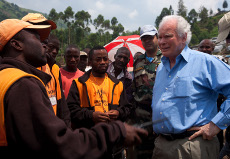October 17, 2010
Advocating for the Vulnerable
By Ross Mountain
While Copenhagen did not live up to anyone’s expectations, one thing that did happen was that the insistence of one small threatened country through the voice of its president, including the use of an underwater cabinet meeting, enabled that country to gain a foothold at the table and have its voice heard in the deliberations. Prior to the conference, the Maldives had taken the initiative to convene a group of a dozen countries in Asia, Africa and Latin America, similarly threatened by climate change. In some cases, this was drought, in others melting glaciers, in others eroding coastlines. This informal grouping of countries has come to be known as the Climate Vulnerable Forum (CVF).

MONUC DSRSG Ross Mountain (right) receives briefing from representative of local NGO (Norwegian Refugee Council) during a visit to IDP camp in Masisi, North Kivu.
In the aftermath of Copenhagen, DARA in conjunction with the government of the Maldives as convener of the Forum agreed that it would be important for a broad public, particularly in reticent, agnostic countries, to understand that climate change is not an issue for tomorrow, its effects are actually being felt today by millions of people across the planet and that these effects will inexorably worsen.
It was felt that an annual publication should be produced, drawing on the latest research and highlighting the impact of climate change on human populations. DARA has picked up the challenge and has assembled a distinguished advisory group and peer review panel to assist it to compile indices and data covering practically all countries of the world in respect of the extent of the danger their populations are now facing on the basis of current trends.
This report is scheduled to be launched in London in early December by the President Mohamed Nasheed of Maldives; Jose Maria Figueres, Former President of Costa Rica, and a representative of the government of Bangladesh. Against this background, the Maldives’ Foreign Minister convened a meeting of Climate Vulnerable Forum countries on the sidelines of the high level session of the UN General Assembly in New York in September. A forward programme was agreed, consolidating the partnership between DARA and the Forum. During the meeting, Bangladesh announced that it would host the main Climate Vulnerable Forum summit in 2011. The Forum will be represented at the leadership level at the upcoming climate summit to be held in Cancun, Mexico.
DARA is also developing additional projects to draw attention to the impact climate change is having on vulnerable populations – and what key measures should be adopted to protect them. Key among these projects is the Risk Reduction Index, undertaken in Central America to measure the effectiveness of risk reduction strategies and policies in place across 14 Central American countries. On November 25th 2010, the Risk Reduction Index Report will be launched in Madrid, featuring a comprehensive assessment of conditions for reducing risk among vulnerable populations and pointing to measures that national and local authorities can take to adapt to climate change.
In a number of quarters the effects of climate change are still being debated but in an increasing number of countries the impact is already being felt by the population. This seemingly inexorable trend and its humanitarian consequences must awaken the key actors to the imperative of taking action.
We must help those already suffering. That involves adaptation for the here and now, and mitigation so things don’t get too out of hand in the not-so-distant future. Much of adaptation is going to mean a simple reinforcing of key humanitarian and development efforts, especially where vulnerabilities are high. Our forthcoming report on climate vulnerability will be helpful in clarifying this. So we hope you stay tuned.
Share this